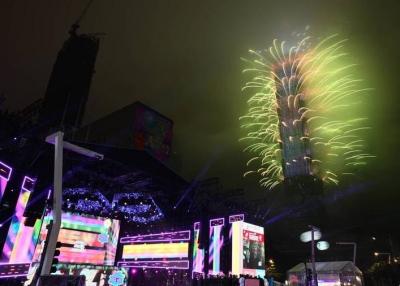Three activists who campaigned for Chinese officials to disclose their wealth were jailed yesterday in the culmination of a high-profile trial that underscores Beijing’s resolve to clamp down on dissent.
The activists were among more than a dozen detained in recent months for their anticorruption activism. Rights groups say the crackdown on the group throws into sharp relief the limits of Chinese President Xi Jinping’s (習近平) campaign against graft.
Despite a few pilot schemes for low-level officials to disclose their assets, public discussion of the wealth of senior leaders remains strictly off-limits.
Graft lubricates the wheels of China’s government, and inquiries into Chinese Communist Party (CCP) elites have revealed billions of US dollars in undisclosed assets, often held by trusted friends or family members.
Two of the activists, Liu Ping (劉萍) and Wei Zhongping (魏忠平), were each sentenced to six-and-a-half years in prison on charges of disrupting public order, “using evil religion to sabotage law enforcement” and “picking fights and provoking trouble.”
Another activist, Li Sihua (李思華), was sentenced to three years in prison, on charges of picking quarrels and provoking disputes.
“It is not fair; it is not just,” Liu’s lawyer Si Weijiang (斯偉江) said by telephone. “The laws can just be bent however [the government] wants in politicized cases.”
The sentences were handed down yesterday by a court in the central Chinese province of Jiangxi. Court officials could not be reached for comment.
Human rights groups condemned the judgement.
In a statement, Amnesty International called the charges “preposterous.”
“Having a small private gathering and holding a banner in a lobby entrance demanding financial transparency from officials should not in any way constitute ‘picking quarrels’ and ‘illegal assembly,’” said William Nee, a China researcher for Amnesty.
The activists, encouraged by Xi’s anticorruption campaign, took photographs of themselves holding banners and placards that read “Strongly urge officials to disclose their assets” and “Xi Jinping, immediately end dictatorship.”
The photos were widely circulated online.
“What was written on the signs is simply a suggestion to the country’s new leaders. It is completely within the scope of the freedom of expression that is within our country’s constitution,” Si said.
The activists were part of a loose-knit group called the New Citizens Movement.

The Taipei MRT is open all night tonight following New Year’s Eve festivities, and is offering free rides from nearby Green Line stations. Taipei’s 2025 New Year’s Eve celebrations kick off at Taipei City Hall Square tonight, with performances from the boy band Energy, the South Korean girl group Apink, and singers Gigi Leung (梁詠琪) and Faith Yang (楊乃文). Taipei 101’s annual New Year’s firework display follows at midnight, themed around Taiwan’s Premier12 baseball championship. Estimates say there will be about 200,000 people in attendance, which is more than usual as this year’s celebrations overlap with A-mei’s (張惠妹) concert at Taipei Dome. There are

LOOKING FOR WHEELS: The military is seeking 8x8 single-chassis vehicles to test the new missile and potentially replace the nation’s existing launch vehicles, the source said Taiwan is developing a hypersonic missile based on the Ching Tien (擎天) supersonic cruise missile, and a Czech-made truck has been tentatively selected as its launch vehicle, a source said yesterday. The Ching Tien, formerly known as Yun Feng (雲峰, “Cloud Peak”), is a domestically developed missile with a range of 1,200km to 2,000km being deployed in casemate-type positions as of last month, an official said, speaking on the condition of anonymity. The hypersonic missile to be derived from the Ching Tien would feature improved range and a mobile launch platform, while the latter would most likely be a 12x12 single chassis

UP AND DOWN: The route would include a 16.4km underground section from Zuoying to Fongshan and a 9.5km elevated part from Fongshan to Pingtung Premier Cho Jung-tai (卓榮泰) yesterday confirmed a project to extend the high-speed rail (HSR) to Pingtung County through Kaohsiung. Cho made the announcement at a ceremony commemorating the completion of a dome at Kaohsiung Main Station. The Ministry of Transportation and Communications approved the HSR expansion in 2019 using a route that branches off a line from Zuoying Station in Kaohsiung’s Zuoying District (左營). The project was ultimately delayed due to a lack of support for the route. The Zuoying route would have trains stop at the Zuoying Station and return to a junction before traveling southward to Pingtung County’s Lioukuaicuo Township (六塊厝).

The Mainland Affairs Council (MAC) yesterday vowed to investigate claims made in a YouTube video about China’s efforts to politically influence young Taiwanese and encourage them to apply for Chinese ID cards. The council’s comments follow Saturday’s release of a video by Taiwanese rapper Chen Po-yuan (陳柏源) and YouTuber “Pa Chiung (八炯)” on China’s “united front” tactics. It is the second video on the subject the pair have released this month. In the video, Chen visits the Taiwan Youth Entrepreneurship Park in Quanzhou in China’s Fujian Province and the Strait Herald news platform in Xiamen, China. The Strait Herald — owned by newspaper